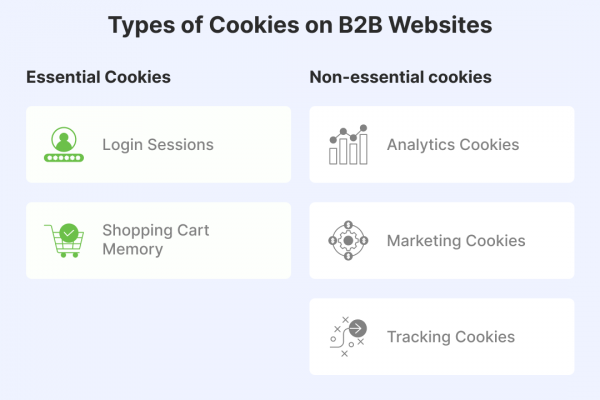In today’s digital-first world, businesses are constantly gathering data to improve performance, understand audiences, and drive growth. But here’s a critical question: do B2B websites need cookie consent like consumer-facing sites? Many business owners assume privacy rules apply only to B2C environments—but that’s a risky misconception.
The reality is that cookie laws are evolving globally to prioritise user privacy, regardless of whether the visitor is a private consumer or a business professional. For B2B website owners, staying compliant is not just about avoiding fines—it’s about maintaining credibility and building trust in a data-sensitive era.
This blog explains how cookies function on B2B websites, highlights the legal basis for cookie consent, clarifies when and why consent is needed, offers practical steps for compliance, and outlines how proper cookie practices benefit businesses long-term
Cookies enhance the user journey by making websites more responsive and efficient. For B2B platforms, they also provide valuable insights into lead behaviour, content performance, and sales funnels.
However, many cookies—especially non-essential ones—process data that can be linked to individuals. That’s where B2B data privacy and cookies come into legal focus.
Cookies are small files stored on a user’s browser when they visit a website. These files track activity, store preferences, and enable certain site features. They can be temporary (session cookies) or persistent and may involve personal or behavioural data.
B2B websites often integrate a mix of cookies to support business operations:

Data protection frameworks around the world—such as the GDPR, CCPA, ePrivacy Directive, and other global laws—are designed to uphold transparency and give users control over their data.
Cookie consent regulations aim to:
The need for cookie consent requirements for B2B websites hinges on several key legal principles. Consent is typically required if cookies collect personal or identifiable data or are used for purposes like analytics, marketing, or personalisation.
Another critical factor is whether users are given a clear option to opt in or opt out. What matters most under data protection laws is not the nature of your business but the functionality of the cookie and whether it processes personal data.
Even in a B2B setting, individuals browsing your website, such as clients, employees, or representatives, retain their data privacy rights. Legal regulations emphasise transparency and user control, regardless of the business context.
Consent is generally required when:
Some common tools that trigger consent obligations include widely used analytics and advertising technologies. These tools often track user behaviour, gather demographic insights, or support remarketing activities.
Examples include Google Analytics, which monitors user interactions; LinkedIn Insight Tag, which tracks conversions from LinkedIn ads; and Facebook Pixel, which supports ad personalisation.
Additionally, many customer relationship management (CRM) platforms come with embedded trackers that collect data for sales or marketing automation. Because these tools process identifiable or behavioural data, they typically require user consent before activation on a B2B website.
Consent is not typically needed for:
These are often covered under “legitimate interest” or are exempt from consent under many regulations.

To begin your compliance journey, it’s essential to run a full audit of your website. This involves identifying all cookies present, understanding their individual purposes, and classifying them as essential or non-essential.
Whether done manually or through automated tools, the audit ensures that no cookie, especially those involving personal data, goes unaccounted for, forming the foundation for effective cookie compliance for businesses.
After completing the audit, the next crucial step is implementing a cookie banner that complies with legal guidelines for B2B cookie consent. The banner should be immediately visible, written in clear language, and provide users with real options to accept, reject, or customise their preferences.
Tips for effective banners:
A detailed and accessible cookie policy is vital for ensuring cookie consent requirements for B2B websites are met. This policy must list every cookie in use, describe its function, and outline how user data is processed and stored.
It should also guide users on how to update their consent preferences and be easily accessible from both the homepage and cookie banner to fulfil transparency obligations.
Maintaining records of user consent is a legal necessity in cookie compliance for businesses. These records should log when and how consent was given, including specific preferences and the consent method used.
Securely storing this information is essential for audit readiness and demonstrating your commitment to B2B data privacy and cookies.
Transparent practices in handling cookies and data give you a competitive advantage. Clients today are privacy-conscious and prefer working with partners who demonstrate ethical practices.
Non-compliance can result in:
Global trends indicate tighter rules ahead. Being proactive with legal guidelines for B2B cookie consent ensures your business is ready to:
So, do B2B websites need cookie banners and consent mechanisms? Yes—if your site uses any non-essential cookies, you must provide users with clear, informed choices. Legal compliance is about respecting privacy, regardless of whether your audience is business or consumer.
A compliant approach not only safeguards your operations but also reflects professionalism and integrity. Take this opportunity to review your practices and optimise your cookie compliance for businesses today.
Transform your B2B website into a privacy-first platform by using Seers AI. We deliver precise, automated cookie consent that meets global laws, builds trust, and safeguards your business growth.
Start free TodayYes, B2B websites often need cookie consent when they use non-essential cookies like analytics, marketing, or tracking cookies. Cookie laws focus on the type of data collected rather than the business model, so if your site processes personal data or tracks users beyond essential functions, you must obtain consent. Compliance builds trust and avoids legal penalties, even in B2B contexts.
Consent is generally required for non-essential cookies such as analytics cookies (e.g., Google Analytics), marketing cookies used for ads and retargeting, and tracking cookies from third-party services. Essential cookies that keep your website functional, like session or security cookies, do not require consent but must be disclosed. Identifying these types is key to ensuring your cookie compliance for businesses.
B2B cookie banners should be clear, concise, and immediately visible to visitors. They must offer genuine choices: accept, reject, and customise cookie preferences without pre-ticked boxes. The language should be straightforward and link directly to the cookie policy for transparency. Providing granular controls helps users manage their data and supports compliance with cookie consent requirements for B2B websites.
Non-compliance can lead to legal penalties, including fines and regulatory scrutiny. It can also damage your brand’s reputation and reduce trust among business clients who value data privacy. Additionally, failing to provide proper cookie consent can result in blocked tracking tools, which limits your ability to gather important analytics and marketing insights crucial for B2B growth.
B2B websites should use a consent management platform to log when, how, and what type of consent users provide. Records must include timestamps, user preferences (accept, reject, customise), and the consent collection method. Secure and organised consent records help demonstrate compliance during audits and protect your business legally while respecting user privacy.
Yes, cookie consent is required in the UK for B2B websites if they use non-essential cookies that collect personal data or track users, such as analytics or marketing cookies. UK law focuses on user privacy regardless of whether the visitor is a business or consumer. Essential cookies for website functionality do not require consent, but transparency and consent are mandatory for other cookie types to comply with UK privacy regulations.


United Kingdom
24 Holborn Viaduct
London, EC1A 2BN
Get our monthly newsletter with insightful blogs and industry news
By clicking “Subcribe” I agree Terms and Conditions

Seers Group © 2026 All Rights Reserved
Terms of use | Privacy policy | Cookie Policy | Sitemap | Do Not Sell or Share My Personal Information.